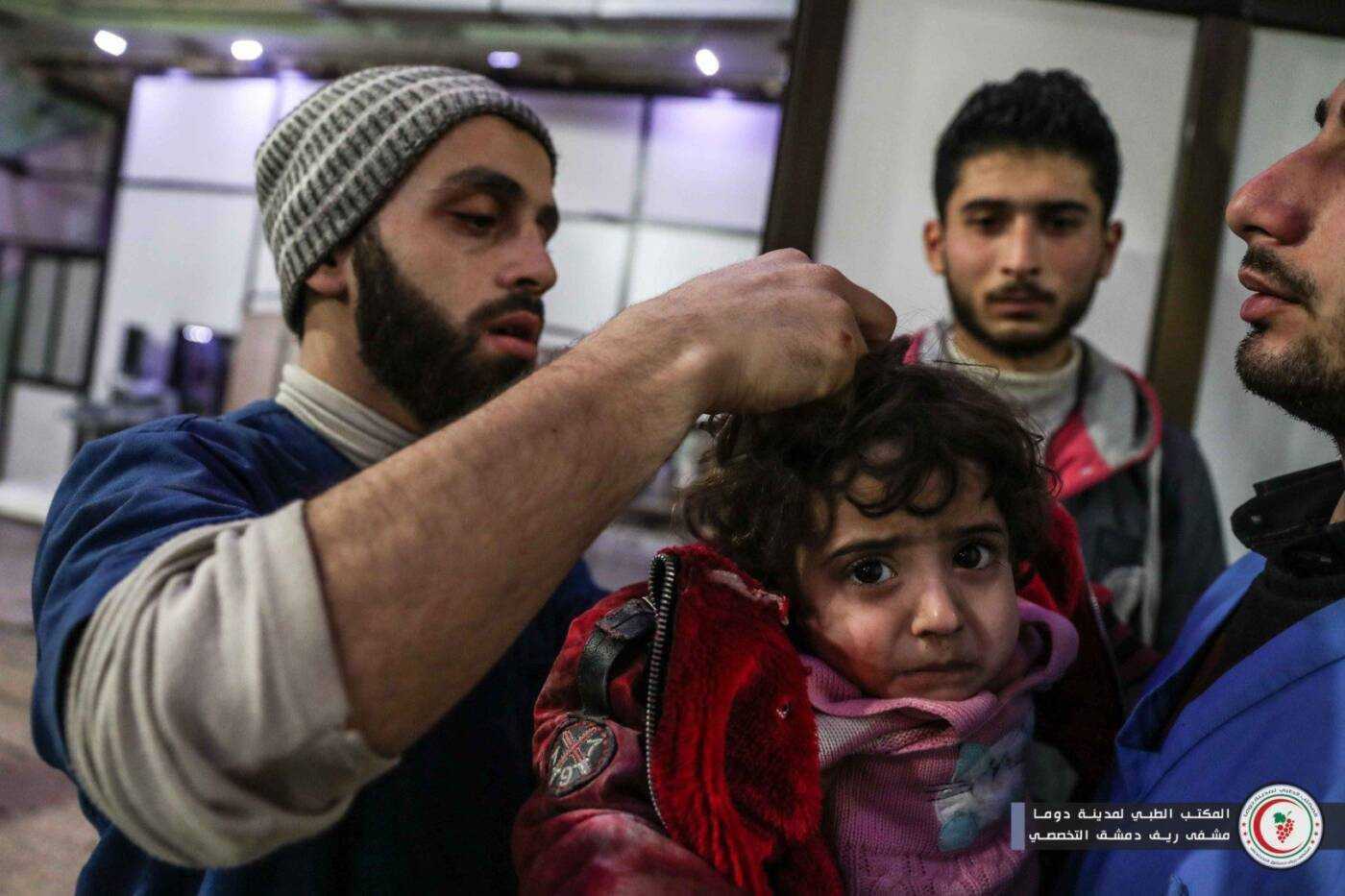East Ghouta doctor: ‘You imagine the next child you treat could be your own’
Ahmad Abu Hamza, a surgeon in East Ghouta, can hardly […]
22 February 2018
Ahmad Abu Hamza, a surgeon in East Ghouta, can hardly focus in the operating room.
His hands tremble. He hears the thunder of government-fired airstrikes and artillery outside his hospital in the besieged opposition enclave, and imagines the worst: his mother, his sickly father, his two young children, his wife, on the operating table.
He imagines the dozens of newly injured he’ll operate on in the hours to come—and the others, trapped under the rubble of their homes, who won’t make it to the hospital in time for life saving surgery.
“You have to use all your strength to stay focused,” Abu Hamza tells Syria Direct’s Ammar Hamou from the hospital he works in the East Ghouta town of Saqba.
At least 200 men, women and children in the rebel-held East Ghouta suburbs of Damascus were killed in the past four days alone, as pro-government forces rain airstrikes and artillery fire on the last major pocket of opposition territory near the capital city. The attacks are some of the bloodiest since a government encirclement of East Ghouta began in 2013.

As many as 24 attacks damaged or destroyed East Ghouta hospitals and clinics this week, the Syrian American Medical Society (SAMS) Borders reported on Thursday.
While the attacks continue across Ghouta, hundreds of injured residents are flooding bombed-out hospitals and clinics that are desperately low on supplies after years of siege.
The influx of injured patients means Abu Hamza stays inside his hospital nonstop, a field doctor on the frontline of a battle he never asked for. He hasn’t left the hospital, he says, for the past three days—not even after a bombing on Wednesday hit the building, lightly injuring him and a colleague.
Amid the carnage, Abu Hamza’s thoughts venture into the morbid, he says. “Maybe the woman they’ve brought in, wrapped up in a blanket, is [my] wife. Maybe that elderly woman is [my] mother.”
“You imagine the next child you treat could be your own.”
Q: How are you coping with the pressure of your workload with so many hospitals in East Ghouta out of service?
I’ve been in the hospital for three days straight without leaving, as have my colleagues.
We can’t go out to get food for the medical staff because the stores and markets are all closed. We’re eating as little as possible. Some of us, myself included, have not seen our families in three days.
There is nothing we can do to stay safe other than keep our work on the lower floors [of the hospital]. We can’t tell the media which hospitals were bombed and are now operational once more, for fear they will be hit again
Q: Has the hospital where you work been bombed this week?
My hospital went out of service two days ago because of a bombing. We made quick repairs and went back to work. Yesterday afternoon, the hospital was bombed again and we had to stop working.
Our patients and injured were transferred to other hospitals. Thank God, there were no [major] injuries. I had a small injury to my hand, and a member of our medical staff was wounded on his forehead.

I’m in the hospital [in Saqba] right now. It is not suitable in any way to treat the injured, but we have no choice. Today, patients were brought to us so we could transfer them to other hospitals, but we couldn’t because those hospitals were also bombed.
Q: What emotional impact is all of this having on you—as a doctor, father, husband and son?
We [in the hospital] are suffering intensely. On top of all the hardship, injuries and severed limbs, we can’t go see our own families. We can’t even communicate with them [easily].
As you treat people, you’re thinking about your own family—are they in danger right now, or not? It is very hard. You’re working with injured people and wondering how your own mother and father are doing. How are your own children? Your wife? You hear things while you’re working—that a bomb hit the town your family is in. It’s an indescribable feeling.
Sometimes, standing in the operating room, you hear about a strike that landed in some neighborhood, and that there are people trapped underneath the rubble. You start thinking about those people under the rubble, the corpses, and you imagine the children and women.
While hearing all this news, you imagine the surgeries you’ll be performing soon, even though you’re already operating on people. Your hands shake. You have to use all your strength to stay focused.
Q: Have you had any time this week to contact your family?
I sent a voice message to my mother today. She’s in a town not even one kilometer away, but I can’t go see her or leave the hospital. Oh God, when I send her messages, I don’t want her to sense that I’m in any danger. But tears fall while I’m talking to her.
My father is sick with a cerebral infarction [a disorder caused by restriction of blood and oxygen to the brain], but I can’t bring him his medicine even though I’m a doctor.
Yesterday, while I was sleeping [in the hospital], I swear to God I saw my daughter in a dream. This is what I’m suffering from.
It’s difficult. After any bombing, you imagine the next child you treat could be your own. Maybe the woman they’ve brought in, wrapped up in a blanket, is your wife. Maybe that elderly woman is your mother. Perhaps you’ll see your father, your uncle.
[My family] has groups on WhatsApp to communicate with one another, and to ask if everyone is okay. The most important thing is that they write that they are still alive.






